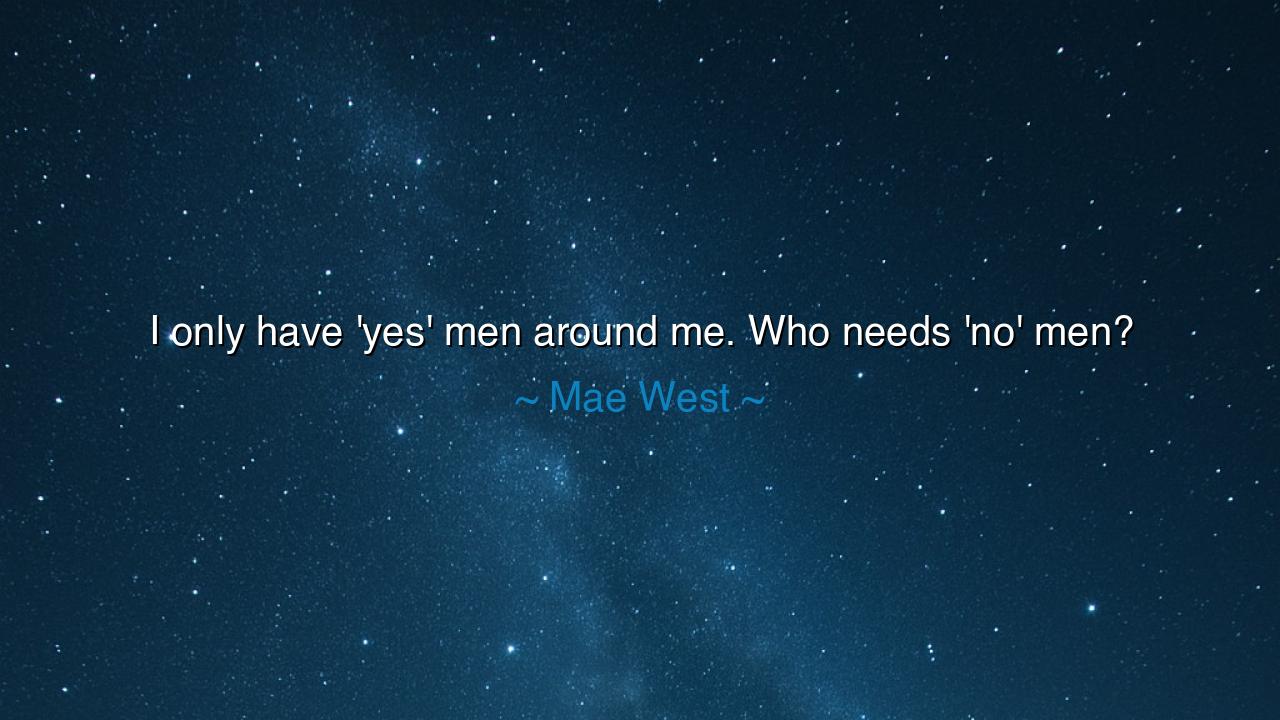
I only have 'yes' men around me. Who needs 'no' men?






The words of Mae West ring with the defiant humor and iron confidence for which she was known: “I only have ‘yes’ men around me. Who needs ‘no’ men?” At first, they appear to be a quip, tossed off with the wit of a performer. Yet beneath the jest lies an assertion of power, independence, and the refusal to be constrained by doubters. West, an actress who carved her place in a world dominated by men, knew well the weight of resistance. By surrounding herself with “yes men,” she declared her right to authority and control over her own destiny.
The ancients themselves understood this desire. Kings and emperors often gathered councils not for contradiction but for affirmation. To be surrounded by “yes men” was to dwell in the comfort of agreement, to avoid the sting of opposition. And yet, the ancients also saw the peril. Xerxes of Persia, when he invaded Greece, was emboldened by advisors who praised his every whim. The result was disaster at Salamis, proving that “yes men” may soothe the pride of rulers, but they can also blind them to truth.
In Mae West’s case, however, the origin of her words is different. She was not a conqueror of nations, but a conqueror of stages, studios, and social convention. In an age when women were expected to obey, to play roles assigned by others, West chose boldness. Her preference for affirmation was not born from blindness, but from a demand for loyalty in a world eager to say “no” to her ambitions, her sensuality, and her freedom. To her, a “no man” was not a truth-teller, but a naysayer who sought to diminish her.
History gives us parallels. Consider Queen Elizabeth I of England. In her court, she carefully balanced voices of dissent and support, but when faced with those who opposed her very right to rule as a woman, she silenced them. For in some moments, to hear “no” endlessly is not to receive wise counsel, but to be drowned in prejudice. Like Mae West, Elizabeth surrounded herself with those who said “yes” to her vision of sovereignty, and through that affirmation, she preserved her throne and guided her nation to glory.
Yet, Mae West’s quip also contains a warning. While it is vital to silence destructive voices that seek only to weaken, one must not close the ear to wisdom that corrects. Too many rulers, intoxicated by the chorus of “yes men,” have fallen into ruin—emperors who ignored warnings, generals who dismissed caution, leaders who mistook agreement for truth. To need no “no men” at all is to risk arrogance; but to mistake every “no” for obstruction is to lose the balance of discernment.
The lesson, then, is twofold: know when to dismiss the “no men” who seek only to block, to diminish, to bind your spirit; but also cultivate the humility to hear the “no” that guards you from folly. There are “no’s” that destroy, but there are also “no’s” that save. Wisdom lies in discerning the difference. Mae West’s strength was in her refusal to let the world’s disapproval chain her; our strength must be in balancing her defiance with the humility to accept necessary correction.
Practical action is clear: seek companions who encourage, who lift, who say “yes” to your growth and to your dreams. But also welcome those rare voices who challenge you with honesty, not out of envy or malice, but out of care for your path. When you face a “no,” ask yourself: is this a chain meant to bind me, or a boundary meant to protect me? In this questioning lies the way of wisdom.
So let Mae West’s words be both inspiration and warning. Surround yourself with the loyal, the affirming, the ones who believe in your fire. Cast away the cynics who live to diminish you. But keep your ear sharp for the truth, even when it comes in the form of “no.” For in the balance of yes and no lies the art of living boldly, yet wisely, in this world.






AAdministratorAdministrator
Welcome, honored guests. Please leave a comment, we will respond soon